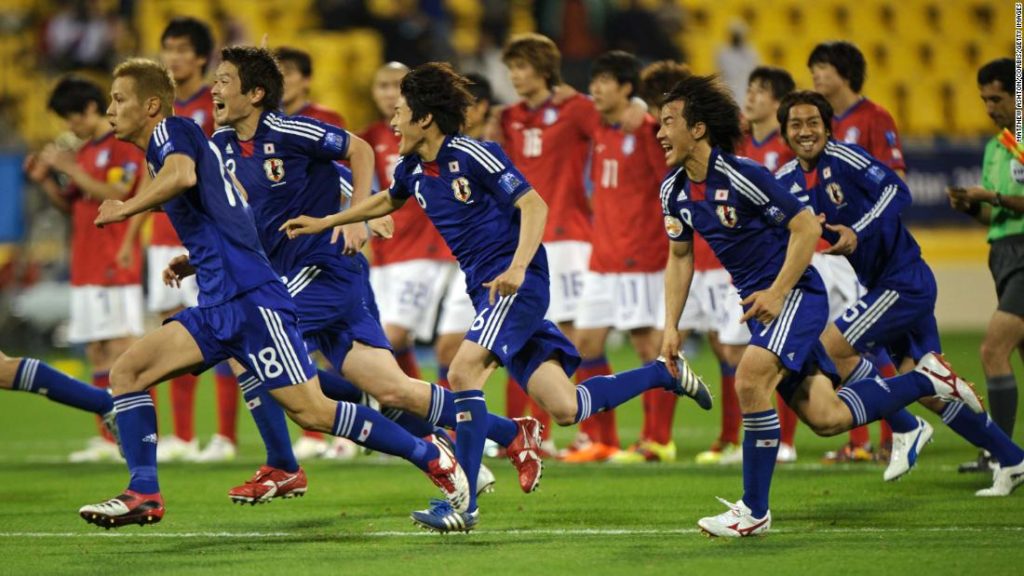Any sporting event between the two countries always has an additional competitive edge given the historical tensions between South Korea and Japan.
Last time the two faced off in an international friendly match in 2011, Japan won 3-0 on home soil.
Since then, the rivals have met four times at the East Asian Football Federation Championship, with South Korea winning two of those matches, Japan one of them, with the other game drawn.
The South Korean national team is now in Yokohama, Japan, for Thursday’s friendly match. However, some South Korean fans have called for the game to be canceled due to concerns over the team’s safety traveling amidst of a global Covid-19 pandemic.
Frightening precedent concerns fans
“When we say don’t do it, just don’t do it, please,” one user commented.
Fans referred to last November when the South Korean national team traveled to Austria for friendlies, where seven players contracted coronavirus despite complying with the Covid-19 regulations implemented to prevent the spread.
Korean football fan Kim Tae-yeon said: “After the trip to Austria, K League clubs were strategically impacted as national players couldn’t participate in the Asia Champions League (ACL) due to Covid-19 infection.”
Kim said the precedent makes him more nervous about the team’s trip to Japan. “The Covid-19 situation in Japan doesn’t look good, and there are infected J League players as well.”
Rivalry welcomes 10,000 spectators
Sporting events have been held behind closed doors or with limited capacity as the Covid-19 pandemic continues to rage on.
Korean football fan Cho Min-sang criticized the JFA’s decisio
“I think letting 10,000 spectators is a decision ignoring all the efforts made around the world as people are being considerate of each other’s safety and making efforts to enjoy the game at the stadium,” he said.
Both Kim and Cho compared spectator capacity to the K League, the South Korean professional soccer league. The K League only welcomes 10% of stadium capacity in Seoul Metropolitan area and 20% in the rest of the nation while away fans are banned to minimize infection risk from traveling.
“I’m concerned for the players, spectators and locals’ health,” Cho said.
Fans must scan QR codes, physically distance, wear masks, check temperatures and wash hands. Chanting, physical contact with others and waving flags or scarves is prohibited and, while eating and drinking is allowed, fans must immediately put their masks back on.
Petition
Individuals had to wear a mask and a transparent face shield as they flew to Narita Airport on Monday.
Upon returning from Japan, 16 drafted K League players will go into cohort quarantine at the Paju National Football Center for seven days.
Some Korean fans are also upset that 16 K league players traveling to Japan could be physically exhausted from the trip and quarantine.
“K League has tight schedule because the ACL and World Cup qualifiers have been postponed,” FC Seoul fan Kim explained. “I’m worried that if a drafted player gets infected, it’d be a huge loss for the club.”
Fans, however, agree with the necessity of quarantining as their concerns over the match is all about the team’s safety while they root for the team’s victory in the rivalry.
“Since the team’s already there [in Japan], I hope they win and come back safely,” one commented on KFA Instagram.
“I sincerely hope that no one gets injured or infected,” Cho said.
You may also like
-
Super League: UEFA forced to drop disciplinary proceedings against remaining clubs
-
Simone Biles says she ‘should have quit way before Tokyo’
-
Kyrie Irving: NBA star the latest to withhold vaccination status
-
Roger Hunt: English football mourns death of Liverpool striker and World Cup winner
-
‘Every single time I lift the bar, I’m just lifting my country up’: Shiva Karout’s quest for powerlifting glory

